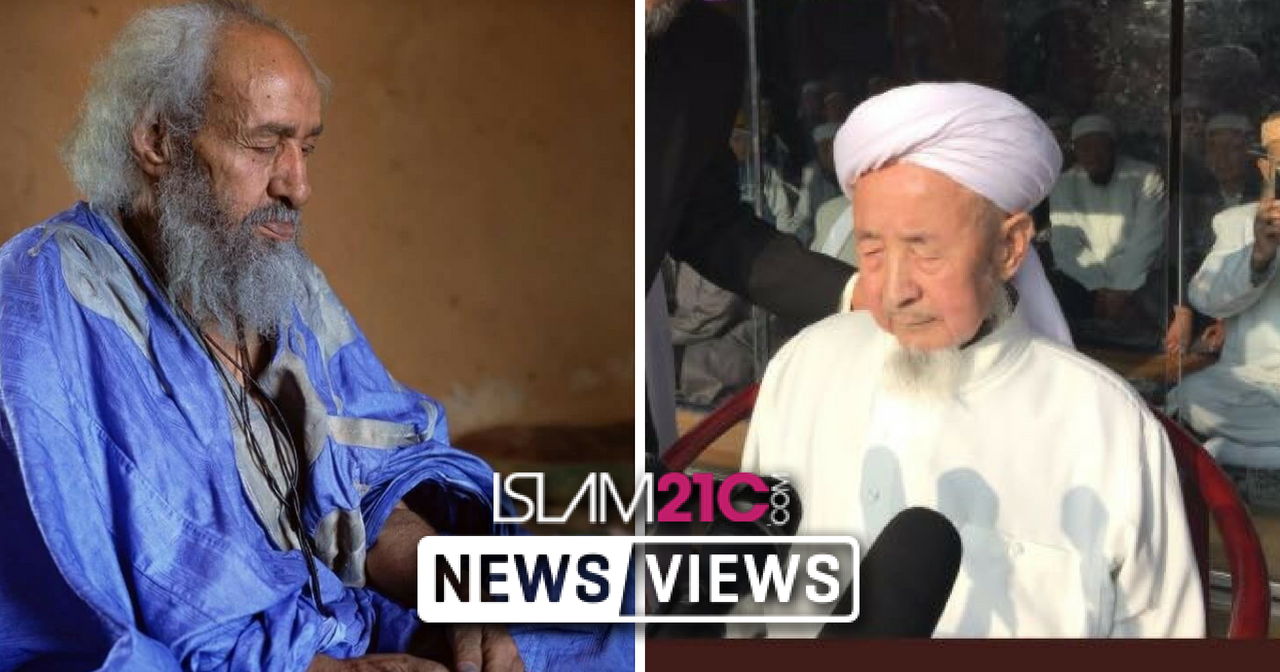Innā lillāhi wa innā ilayhi rājiʿūn. Indeed, to Allāh we belong, and to Him we are returning.
The great Mauritanian Islamic scholar, Sheikh Murabit al-Hajj and one of the senior scholars of China, Sheikh Dunig Qawan Abdullah have passed on to meet their Lord.
Allāh (subḥānahu wa taʿālā) declares,
Wherever you are, death will overtake you, even if you be in lofty towers. [1]
Everyone shall taste death. And only on the Day of Resurrection shall you be paid your wages in full. And whoever is removed away from the Fire and admitted to Paradise, he indeed is successful. The life of this world is only the enjoyment of deception. [2]
Death is a certainty of life, indeed life itself is teleological; man shall die and be questioned. It is in this sense that Allāh informs humans by way of counsel and encouragement that it is only the believers who are successful, those who avoid the fire and secure admittance into paradise. When a believer dies it is a time of great tragedy and loss for the community, but those who submit to the will of Allāh pay heed to what has been revealed,
And certainly, We shall test you with something of fear, hunger, loss of wealth, lives and fruits, but give glad tidings to the patient; those who when afflicted with calamity, say: from Allāh do we come, and to Him we shall return.” [3]
Sheikh Murabit al-Hajj who passed away at the age of 105 was one of the senior scholars in Mauritania who was known for his zuhd, worship and mastering of the sciences of Islam. The Sheikh is also the cousin of Sheikh Muhammad al-Hassan Walid al-Dido al-Shanqītī who is the President of the Center for the Development of Scholars.
In 2016, Sheikh Murabit al-Hajj was selected as amongst ‘The 500 Most Influential Muslims’ by The Royal Islamic Strategic Studies Centre. [4]
Ustadh Asif Uddin had the opportunity to meet the Sheikh in the summer of 2002. On his journey to meet him, he said:
“We left from the capital city Nouakchott and it took us more than 16 hours to get to where the Sheikh lived. He lived literally in the middle of nowhere. We had to go up a mountain pass and the closest civilization to the village he was staying in was probably around two hours away. It was very difficult to get to where he lived. I stayed in the village of Sheikh Murabit for three nights and very few people come to that area. When we came, they were very hospitable to us and they slaughtered a goat. They don’t have meat that often. We got to spend some time with the Sheikh who was very old and we sat down with him and asked him to make Du’a for us. His students told us that the Sheikh had memorised the entire Tafsir al-Qurtubi which is around 11 volumes. The way that they would be able to tell the health of the Sheikh was if he was able to lead the Salah. Alhamdulillah when I was there he lead all the Salah’s, however they were quite short. The Sheikh mostly was in a lying down position or sitting up position in his residence which was made up of tents. In order to get to the Salah, they would actually have to carry him. There would be one person on either side of him to carry him to the musalla area and then he would have enough strength just to stand up and pray.
Sheikh Dunig Qawan Abdullah also passed away this week, he was one of the senior scholars in China and the Imam of the Dongguan mosque in the Northern city of Shenyang. His Janazah was attended by more than 200,000 people.
١- إنا لله وإنا إليه راجعون . توفي أمس الإثنين 3-11-1439 أحد كبار علماء #الصين . الشيخ الإمام دونغ قوان عبد الله ما تشانغ تشين إمام جامع دنقوان في مدينة شيننغ شمال غرب #الصين وصلى عليه صلاة الجنازة اليوم الثلاثا بعد صلاة الظهر في مشهد مهيب حضره أكثر من مائتي ألف . pic.twitter.com/dzSFlsHo8W
— أ.د. عيسى الدريبي (@DR_Alduraibi) July 17, 2018
On receipt of the news of the passing of the two scholars, Shaykh (Dr) Haitham al-Haddad said:
“I would like to extend our community’s sincerest condolences upon the passing of these two great scholars, Sheikh Murabit al-Hajj and Sheikh Dunig Qawan Abdullah, to their family, students and community at large.”
We beseech Allāh (subḥānahu wa taʿālā) to expand their graves, shower His infinite mercy upon them, to forgive their sins and grant their families patience. We also ask Allāh (subḥānahu wa taʿālā) to make this difficult time an expiation of sins and the raising of rank in the sight of our Lord.
[donationbanner]
Source: www.islam21c.com
Notes:
[1] 4:78
[2] 3:185
[3] 2:155-156
[4] “Introduction: A Regional Survey – 2016”. The Royal Islamic Strategic Studies Centre. 1 January 2016.









